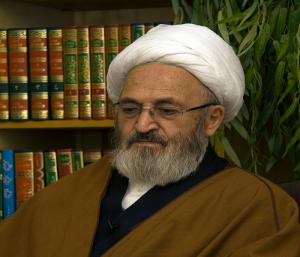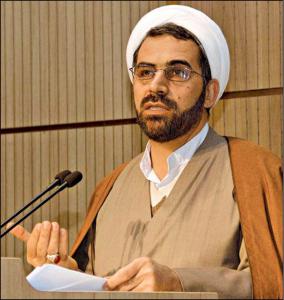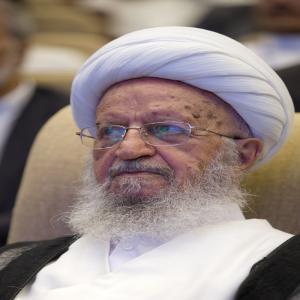Various Articles
Contemplation (Tafakkur)
- Published at
-
- Author:
- Sayyid Khomeini

Muhammad ibn Ya’qub (al-Kulayni), from ‘Ali ibn Ibrahim, from his father, from al-Nawfali, from al-Sakuni, from Abu ‘Abd Allah (Imam al Sadiq) (A) that he said: Amir al-Mu’minin (A) used to say: “Arouse your heart to contemplation; keep your side clear off the night; and be heedful towards your Lord.”
Love in The Relationship between God and Man
- Published at
-
- Author:
- Ahmed Haneef
- Source:
- http://www.ic-el.com
 Some of the great Islamic philosophers have said that love is the relationship we have with those things that contribute to the maintenance and completion of our existence. When we experience or meet such things we don’t like to be separated from them and we feel a great need for them in our lives. This attachment is what we call love.Thus we find ourselves loving food, loving wealth, loving power, the opposite sex, etc.,
Some of the great Islamic philosophers have said that love is the relationship we have with those things that contribute to the maintenance and completion of our existence. When we experience or meet such things we don’t like to be separated from them and we feel a great need for them in our lives. This attachment is what we call love.Thus we find ourselves loving food, loving wealth, loving power, the opposite sex, etc.,
Gender Responsibilities in the light of Allah’s Divine Attributes
- Published at
-
- Author:
- Ahmed Haneef
- Source:
- http://www.ic-el.com
 In commenting on Allah’s saying in the Holy Qur’an, “It is We who have distributed among them their livelihood in the life of this world.” (Q 43:32) Imam Ali (as) is reported to have said:“Allah the Exalted told us that employment is one of the means of people’s livelihood. He, in His wisdom, diversified their aspirations, motivations, and other such states. Thus He made man’s employment of one another one of the means of people’s livelihood....If every one of us was forced to build for himself, make his own furniture and produce everything for himself....
In commenting on Allah’s saying in the Holy Qur’an, “It is We who have distributed among them their livelihood in the life of this world.” (Q 43:32) Imam Ali (as) is reported to have said:“Allah the Exalted told us that employment is one of the means of people’s livelihood. He, in His wisdom, diversified their aspirations, motivations, and other such states. Thus He made man’s employment of one another one of the means of people’s livelihood....If every one of us was forced to build for himself, make his own furniture and produce everything for himself....
Religious Context of Scientific Development
- Published at
-
- Author:
- Hamidreza Ayatollahy, Professor of Philosophy Department Allameh Tabatabaee University Tehran Iran
- Source:
- https://ayatollahy.academia.edu/HamidrezaAyatollahy/Papers
 Abstract:
In my paper, I am going to answer the following questions in detail with their necessary evidence:
What are the six periods of development in science in the history of science? And what are their characteristics?
What are the specifications of the cultures in which those developments occur?
Why the development of science happened in those cultures? And what are those contexts that prepared the possibility of each development?
How can culture be influenced by every development in science?
In this respect there are some theories among Western and Islamic philosophers that I am going to introduce them with my own belief that the role of Ibrahimian religions (as an important dimension of culture) are very important as only providing the context in which the development may be possible (although some dogmas were obstacle for some developments).
Abstract:
In my paper, I am going to answer the following questions in detail with their necessary evidence:
What are the six periods of development in science in the history of science? And what are their characteristics?
What are the specifications of the cultures in which those developments occur?
Why the development of science happened in those cultures? And what are those contexts that prepared the possibility of each development?
How can culture be influenced by every development in science?
In this respect there are some theories among Western and Islamic philosophers that I am going to introduce them with my own belief that the role of Ibrahimian religions (as an important dimension of culture) are very important as only providing the context in which the development may be possible (although some dogmas were obstacle for some developments).
The Spiritual Significance of Jihad
- Published at
-
- Author:
- Seyyed Hossein Nasr
- Source:
- www.al-islam.org
 And those who perform jihad for Us, We shall certainly guide them in Our ways, and God is surely with the doers of good. (Quran 39:69)
You have returned from the lesser jihad to the greater jihad. (Hadith)
And those who perform jihad for Us, We shall certainly guide them in Our ways, and God is surely with the doers of good. (Quran 39:69)
You have returned from the lesser jihad to the greater jihad. (Hadith)
Why Theology?
- Published at
-
- Author:
- Muhammad Sa‘idi-Mihr Amir Divani
- Source:
- www.imamreza.net
 At first, we might see ourselves faced with this fundamental question: “What is the importance and necessity of endeavoring to understand God and what role does this understanding have in our personal and social lives?”
At first, we might see ourselves faced with this fundamental question: “What is the importance and necessity of endeavoring to understand God and what role does this understanding have in our personal and social lives?”
The Generalities of Jihad
- Published at
-
- Author:
- Allamah Syed Muhammad Husain Tabataba'i
 Every creature defends his life as well as his interests. Like others, every creature is equipped with a defensive power that enables him to combat with his enemies. With his Allah-given instinct and nature, man believes that he must defend himself and destroy the enemy who wants to destroy him and who never gives up his animosity.
Every creature defends his life as well as his interests. Like others, every creature is equipped with a defensive power that enables him to combat with his enemies. With his Allah-given instinct and nature, man believes that he must defend himself and destroy the enemy who wants to destroy him and who never gives up his animosity.
The Rules of the Bay' (Selling)
- Published at
-
- Author:
- Allamah Syed Muhammad Husain Tabataba'i
 What is bay'? The bay' (selling) means the sale and exchange of a property with another property in a way that the owner, who is ,called "the seller" of the merchandise transfers the ownership of his property to the other party in exchange for money, and the other party called "the buyer" pays the money to the seller in exchange for the merchandise.
What is bay'? The bay' (selling) means the sale and exchange of a property with another property in a way that the owner, who is ,called "the seller" of the merchandise transfers the ownership of his property to the other party in exchange for money, and the other party called "the buyer" pays the money to the seller in exchange for the merchandise.
Does Prayer Have A Role In Acceptance of All Deeds?
- Published at
-
- Author:
- Shaykh Nasir Makarim Shirazi & Ayatullah Ja'far Subhani
 Question: I have seen an objection against Muslims in books that the Islamic scholars have written in the books of jurisprudence and traditions that till the Prayer is not accepted the other deeds will not be accepted.
Question: I have seen an objection against Muslims in books that the Islamic scholars have written in the books of jurisprudence and traditions that till the Prayer is not accepted the other deeds will not be accepted.
Patience (Sabr)
- Published at
-
- Author:
- Sayyid Khomeini
 Muhammad ibn Ya’qub al-Kulayni (R) from a group of his teachers, from Ahmad ibn Muhammad ibn Khalid, from his father, from ‘Ali ibn al-Nu’man, from ‘Abd Allah ibn Muskan, from Abu Basir, who says, “I heard Abu ‘Abd Allah (A) say, ‘A free human being is free in all circumstances. Should a misfortune befall him he bears it with patience (sabr). If calamities strike him, they don’t shatter him. If taken captive and subdued; he turns hardship into ease, as was the case of Joseph, the truthful and trustworthy (A). His freedom saved him from harm, although he was enslaved, subdued, and imprisoned. The darkness of the pit, the dread and whatever befell him did him no harm, until God favored him and made the insolent tyrant, who had been his master, his slave. Then God made him His apostle and through him was merciful to a people. In this way patience is followed by good. So be patient and reconcile yourself to patience in order to be rewarded.”
Muhammad ibn Ya’qub al-Kulayni (R) from a group of his teachers, from Ahmad ibn Muhammad ibn Khalid, from his father, from ‘Ali ibn al-Nu’man, from ‘Abd Allah ibn Muskan, from Abu Basir, who says, “I heard Abu ‘Abd Allah (A) say, ‘A free human being is free in all circumstances. Should a misfortune befall him he bears it with patience (sabr). If calamities strike him, they don’t shatter him. If taken captive and subdued; he turns hardship into ease, as was the case of Joseph, the truthful and trustworthy (A). His freedom saved him from harm, although he was enslaved, subdued, and imprisoned. The darkness of the pit, the dread and whatever befell him did him no harm, until God favored him and made the insolent tyrant, who had been his master, his slave. Then God made him His apostle and through him was merciful to a people. In this way patience is followed by good. So be patient and reconcile yourself to patience in order to be rewarded.”
Tawbah (Repentance)
- Published at
-
- Author:
- Sayyid Khomeini
 With a continuous chain of transmission reaching the pioneering leader, a proof of the sect and a chief of the ummah, Muhammad ibn Ya’qub al-Kulayni (R) from Muhammad ibn Yahya, from Ahmad ibn Muhammad ibn ‘Isa, from, al-Hasan ibn Mahbub, from Mu’awiyah ibn Wahab, who said, “I heard Abu ‘Abd Allah (A) says: ‘When a servant turns to God with sincere repentance (tawbatan nasuhan), God loves him and covers him (i.e. his sins) in the world and the Hereafter.’ I said, ‘And how does He cover him? ‘The Imam (A) replied, “He makes the two angels (assigned to write his deeds) forget that which they have written of his sins. Then He inspires his bodily members (saying), “Do conceal his sins,” and He inspires the earth’s places (saying), “Conceal the sins that he used to commit over you.” Then he meets God, at the time that he meets Him, in such a manner that there is nothing to give witness against him regarding any sin."
With a continuous chain of transmission reaching the pioneering leader, a proof of the sect and a chief of the ummah, Muhammad ibn Ya’qub al-Kulayni (R) from Muhammad ibn Yahya, from Ahmad ibn Muhammad ibn ‘Isa, from, al-Hasan ibn Mahbub, from Mu’awiyah ibn Wahab, who said, “I heard Abu ‘Abd Allah (A) says: ‘When a servant turns to God with sincere repentance (tawbatan nasuhan), God loves him and covers him (i.e. his sins) in the world and the Hereafter.’ I said, ‘And how does He cover him? ‘The Imam (A) replied, “He makes the two angels (assigned to write his deeds) forget that which they have written of his sins. Then He inspires his bodily members (saying), “Do conceal his sins,” and He inspires the earth’s places (saying), “Conceal the sins that he used to commit over you.” Then he meets God, at the time that he meets Him, in such a manner that there is nothing to give witness against him regarding any sin."
Desire and Hope
- Published at
-
- Author:
- Imam Khomeini
 Muhammad ibn Ya’qub (al-Kulayni) (R) reports from al-Husayn ibn Muhammad, he from Mu’alla ibn Muhammad, from al-Washsha’, from ‘Asim ibn Humayd, he from Abu Hamzah, who narrates on the authority of Yahya ibn ‘Aqil that the latter reported that Amir al-Mu’minin ‘Ali (A) said, “I am apprehensive for you on account of two things: submission to desire and cherishing of inordinate hope. As to desire, it prevents one from haqq (Truth, righteousness, God); and as to inordinate hope, it makes man oblivious of the Hereafter.”
Muhammad ibn Ya’qub (al-Kulayni) (R) reports from al-Husayn ibn Muhammad, he from Mu’alla ibn Muhammad, from al-Washsha’, from ‘Asim ibn Humayd, he from Abu Hamzah, who narrates on the authority of Yahya ibn ‘Aqil that the latter reported that Amir al-Mu’minin ‘Ali (A) said, “I am apprehensive for you on account of two things: submission to desire and cherishing of inordinate hope. As to desire, it prevents one from haqq (Truth, righteousness, God); and as to inordinate hope, it makes man oblivious of the Hereafter.”
Man’s God-Seeking Nature
- Published at
-
- Author:
- Imam Khomeini
 Muhammad ibn Ya’qub (al-Kulayni), from Muhammad ibn Yahya, from Ahmad ibn Muhammad, from Ibn Mahbub, from’ Ali ibn Ri’ab, from Zurarah, who said, I asked Abu ‘Abd Allah (Imam al Sadiq) (A) regarding the words of God: God’s creation (fitrah) upon which He originated mankind. (30:30). The Imam(A) answered: “He originated mankind upon tawhid.”
Muhammad ibn Ya’qub (al-Kulayni), from Muhammad ibn Yahya, from Ahmad ibn Muhammad, from Ibn Mahbub, from’ Ali ibn Ri’ab, from Zurarah, who said, I asked Abu ‘Abd Allah (Imam al Sadiq) (A) regarding the words of God: God’s creation (fitrah) upon which He originated mankind. (30:30). The Imam(A) answered: “He originated mankind upon tawhid.”
The Islamic Concept of Anthropology
- Published at
-
- Author:
- Muhammad Sa‘idi-Mihr Amir Divani
- Source:
- www.imamreza.net
 The human race is mysterious and mystifying. The various aspects of existence are more profound than can be understood. Despite constant endeavor throughout history to solve the riddle of humanity’s existence, there are still incalculable unrevealed mysteries. Even now that we stand upon the heights of a multitude of anthropological studies and research, we are still faced with a number of ambiguities. It is astonishing that with the development of these studies still more unconsidered perplexities unfold.
The human race is mysterious and mystifying. The various aspects of existence are more profound than can be understood. Despite constant endeavor throughout history to solve the riddle of humanity’s existence, there are still incalculable unrevealed mysteries. Even now that we stand upon the heights of a multitude of anthropological studies and research, we are still faced with a number of ambiguities. It is astonishing that with the development of these studies still more unconsidered perplexities unfold.
Historical Books of Shi'ites in Kalam, Hadith and Rijal
- Published at
-
- Author:
- Rasul Ja'farian
 Part of the Shi‘ite kalāmī works have extended the discussion to history in proportion with its importance to the issue of Imamate. The discussions on the Imamate could generally be divided into two sections. A rational discussion to prove the necessity for the existence of the Imam, and a historical discussion to prove existence of divine designation (nass) and the reason for lack of attention to nass by others as well as criticism of the actions of certain companions of the Prophet in this regard.
Part of the Shi‘ite kalāmī works have extended the discussion to history in proportion with its importance to the issue of Imamate. The discussions on the Imamate could generally be divided into two sections. A rational discussion to prove the necessity for the existence of the Imam, and a historical discussion to prove existence of divine designation (nass) and the reason for lack of attention to nass by others as well as criticism of the actions of certain companions of the Prophet in this regard.
Why Do We Pray Five Prayers In Three Times?
- Published at
-
- Author:
- Shaykh Nasir Makarim Shirazi
 Question: What is the reason that we pray Zuhr-Asr and Maghrib-Isha prayers together, whereas for every Prayer there is a special time and the great leaders of Islam used to pray on the particular times. That is they used to pray five prayers are five different times a day?
Question: What is the reason that we pray Zuhr-Asr and Maghrib-Isha prayers together, whereas for every Prayer there is a special time and the great leaders of Islam used to pray on the particular times. That is they used to pray five prayers are five different times a day?
The Best of Actions
- Published at
-
- Author:
- Shaykh Nasir Makarim Shirazi
 The Prophet Muhammad (S) has said, “O' ‘Ali! The greatest of actions are the following three: Your acting in fairness with people more than with your own self; showing equality with your brother for Allah the Noble and Grand; remembering Allah, Glory and Greatness be to Him, in all states.”
The Prophet Muhammad (S) has said, “O' ‘Ali! The greatest of actions are the following three: Your acting in fairness with people more than with your own self; showing equality with your brother for Allah the Noble and Grand; remembering Allah, Glory and Greatness be to Him, in all states.”
Weeping During Tragic Times
- Published at
-
- Author:
- Sheikh Zayn ad-Din Ali ibn Muhammad al-Jabil Amili
- Source:
- Translated from the Arabic by Yasin T. al-Jibouri
 Be informed that weeping by itself does not clash with perseverance or with accepting destiny; rather, it is a human norm of behavior, an indication of one's humanity, an expression of affection towards kinsfolk or a loved one; so, there is no harm in demonstrating it, nor is there any harm in getting out to the open as long as it does not contain conditions which bring about Wrath or show alarm and thus take away rewards, such as one tearing his garment or beating his face or beating on the thigh, etc.
Be informed that weeping by itself does not clash with perseverance or with accepting destiny; rather, it is a human norm of behavior, an indication of one's humanity, an expression of affection towards kinsfolk or a loved one; so, there is no harm in demonstrating it, nor is there any harm in getting out to the open as long as it does not contain conditions which bring about Wrath or show alarm and thus take away rewards, such as one tearing his garment or beating his face or beating on the thigh, etc.
How I Became A Muslim
- Published at
-
- Author:
- Sister Diana Beatty
- Source:
- http://www.al-islam.org
 I was raised in a moderately Christian home in Colorado. Religion was never much of an issue in my house. My father was raised as a Mormon, my mother as a Protestant. I can remember my parents dropping my brother off at Sunday School, but instead of going to church while we were in religious classes, they would go home.
I was raised in a moderately Christian home in Colorado. Religion was never much of an issue in my house. My father was raised as a Mormon, my mother as a Protestant. I can remember my parents dropping my brother off at Sunday School, but instead of going to church while we were in religious classes, they would go home.
How I Found the Right Path
- Published at
-
- Author:
- Muhammad Yusuf
- Source:
- http://www.al-islam.org
 My journey began when, on starting a new job, I first met a follower of Ahl ul-Bayt. Up until that time, I knew little about those who were called Shi'as - except what I had heard from Sunni brothers, which to say the least was not very complimentary.
My journey began when, on starting a new job, I first met a follower of Ahl ul-Bayt. Up until that time, I knew little about those who were called Shi'as - except what I had heard from Sunni brothers, which to say the least was not very complimentary.


